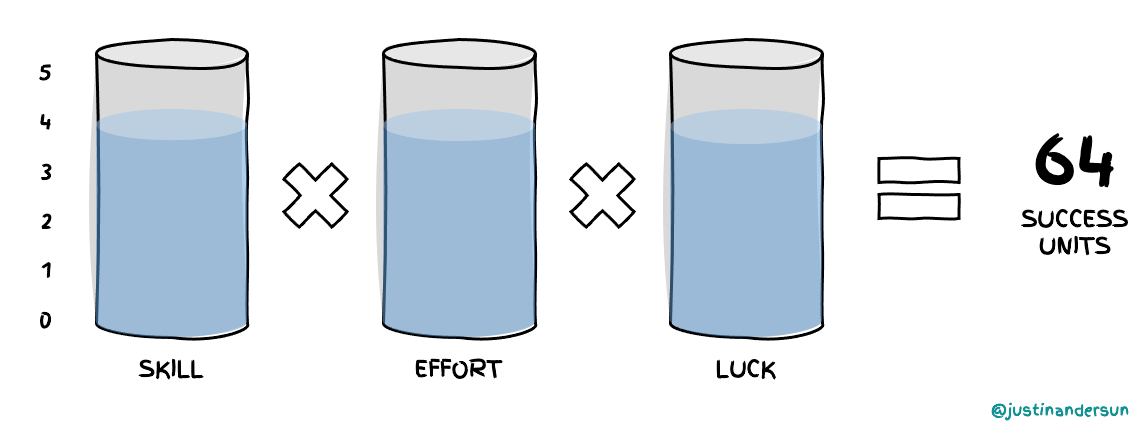31 March 2022
Magical Buckets
Sometimes I think about that scene from Fight Club when Tyler Durden (played by Brad Pitt) holds a gas station attendant at gunpoint and asks him what dream he quit. The sobbing attendant confesses he wanted to be a veterinarian, but it was too hard. Durden allows him to live, and with the fear of death in him, the gas station attendant runs off to become a vet.
This clarity of purpose is cathartic for me. But how could this traumatized gas station attendant become a successful vet? Having a goal is great, but it’s a pipedream without an underlying framework for success.
Talent vs. Effort
Imagine two buckets, one for talent and one for effort. Each can hold zero to five units of magic water. When splashed together, the two buckets multiply their value and yield “success units” (money, fame, societal value, etc.). Talent vs. effort is a classic idea for guiding one’s energy. Talent is fixed—a quantity determined from birth or early life circumstances, and effort is the dynamic lever to unlock that latent potential.
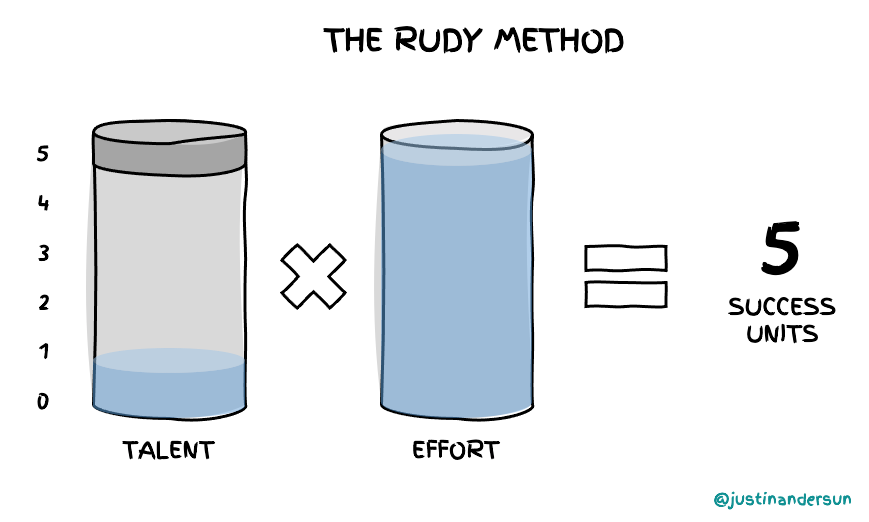
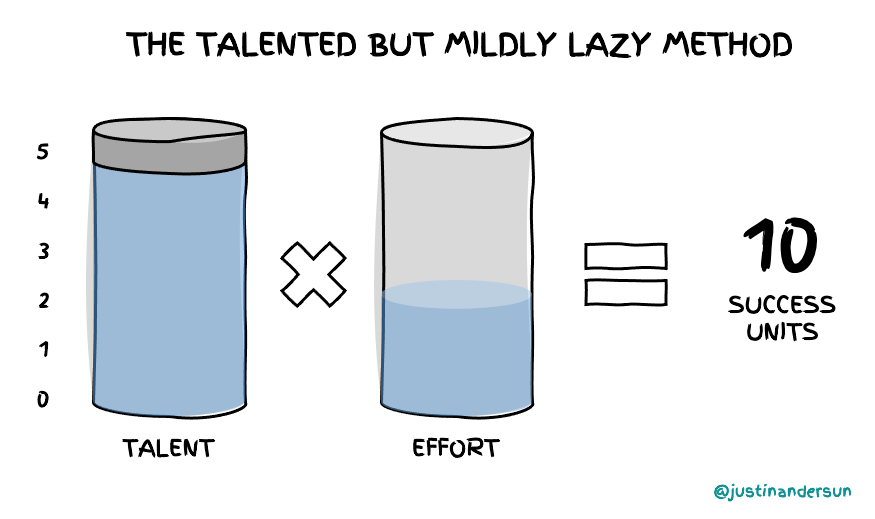
10,000 Hours vs. Deliberate Practice
This talent vs. effort scale is relevant for physical endeavors. No matter how hard I try, I will not be a professional basketball player. This scale (or any scale that measures height) is 100% accurate in measuring that. But I think the talent vs. effort scale is irrelevant for intellectual or creative efforts. Let’s consider an aspiring cartoonist, Carthage. Carthage could draw hilarious bug-eyed people before he could walk—he’s oozing with natural talent. And he’s a hard worker! So he spent years putting in the “effort” to produce thousands of drawings. Success is guaranteed, right?
The 10,000 Hour Rule claims that anyone will become an expert if they devote 10,000 hours to something. Yet, after 10,000 hours, Carthage’s cartoons are still childish crayon drawings (sound familiar?). In pursuits of the mind, talent isn’t fixed. As explored in Anders Ericson’s Peak, deliberate practice can significantly improve our skills in any domain. Traditional practice might include mindless repetition, but deliberate practice is a systematic method of focused attention incrementally improving performance. If Carthage deliberately practiced the art of cartooning—panel layout, joke design, or better illustration techniques—he could transform his natural talent into skill.
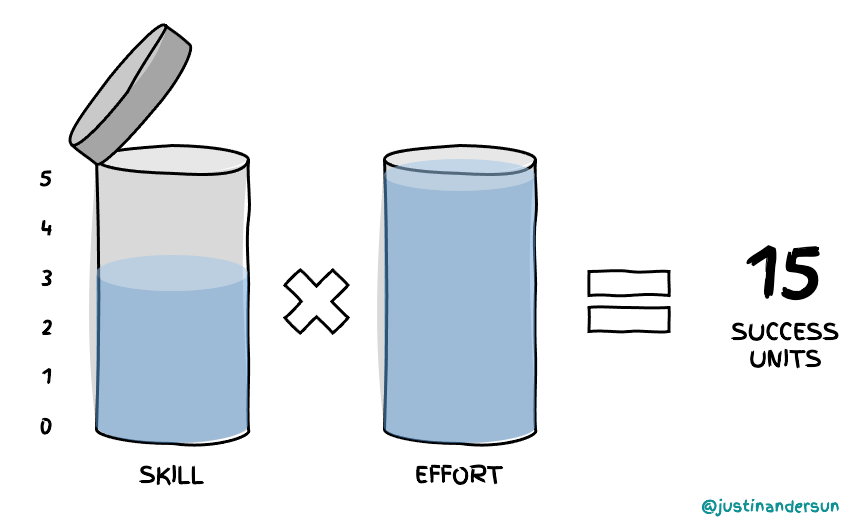
Talent x Effort = Skill
Skill x Effort = Success
Pop the lid off talent to transform it into skill.
Doing vs. Telling
After deliberate practice, Carthage could be the best cartoonist in the world—highly skilled in the craft and prolific—but remain unsuccessful in terms of recognition, compensation, or societal impact. He’d die an unknown genius, his gift to the world unopened, simply because he was unlucky. Skill and effort are only part of the story. Luck plays a considerable role in creative endeavors—launching a business, filming a movie, or writing a book. It’s easy to dismiss luck as a mystical force that we have no control over. “I’m unlucky – good things don’t happen to me.” This defeatist attitude isn’t helpful—I’ve fallen into this more times than I can count. While some people are luckier than others, think about luck as “expanding opportunities.” One’s luck surface area (as I’ve discussed previously) is another two-dimensional scale with effort—doing things and telling people about them. Sharing your work increases the opportunity for luck to strike.
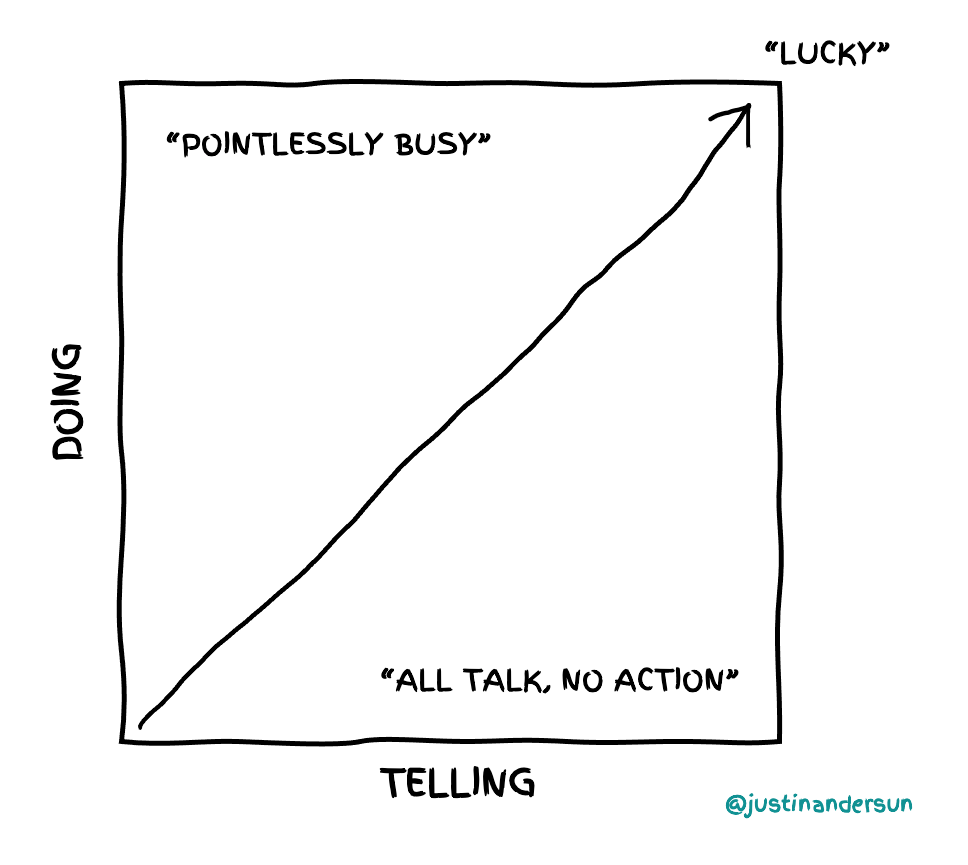
Even luck takes effort. And like skill, luck is also malleable.
Effort, Skill, and Luck
Imagine three buckets—effort, skill, and luck. Everyone starts with different levels in each. Some people are born with innate talent, and others are gifted great opportunities. But nothing matters if we don’t put in the effort. When buckets are untouched, their magical water evaporates. To earn success, find the right level to invest in each bucket.
Consider Carthage’s cartooning:
- Effort (work on producing) = draw cartoons consistently
- Skill (work on learning) = deliberately practice skills to strengthen acumen
- Luck (work on sharing) = submit cartoons to contests, share online, talk to other cartoonists
One without the other two won’t lead anywhere. If you aren’t producing (Effort), nothing will matter. You’ll study and talk but do nothing. If you aren’t reading and learning (Skill), you’ll stay stagnant. Ten thousand hours won’t magically make you good. If you aren’t sharing and promoting your work (Luck), your masterpiece will remain in a drawer forever.
Fill the three magical buckets, and maybe, just maybe, you’ll find creative success.
